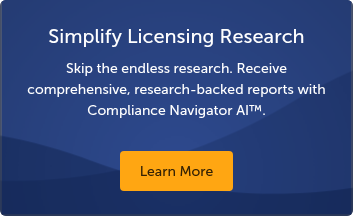
Durable Medical Equipment License
Durable medical equipment (DME) companies are regulated at both the state and federal level depending on the type of equipment sold and where it is being sold. Whether you are looking to start a DME business or want to expand your company to new states, you need to be aware of those regulations.
What Is a Durable Medical Equipment Provider?
Durable medical equipment is any medical device that provides therapeutic benefits to individuals because of specific illnesses or conditions. Most DME equipment serves a medical purpose, is ordered by a physician, is reusable, and is able to be used inside the home. Common examples include wheelchairs, crutches, and catheters.
Starting a DME business is a multi-step process that involves state and federal licensing requirements. You could be subject to civil and criminal penalties without the proper licenses. To ensure your business is in compliance, consider outsourcing your licensing needs to Harbor Compliance.
How to Enroll as a DME Provider
To start a DME provider business, you must first obtain a National Provider Identifier (NPI) number. An NPI number is a ten-digit number used for administrative and billing transactions. It is required by the Center for Medicare and Medicaid Services (CMS) as well as commercial healthcare insurers.
Once you have your NPI number, you will need to go through the DME accreditation process with an approved accreditation company. Once you submit your application, the respective company will use a specific set of quality standards to assess your chances of approval. The accreditation process can take upwards of nine months, depending on where you are looking to start your business and the state requirements.
One of the main costs associated with starting a DME business is the severity bond. CMS requires a $50,000 bond. To get bonded, you are required to pay a fraction of the bond premium, which is typically between one and five percent.
You will also need to appoint a registered agent to receive lawsuit notices and other legal or government notices. Then, you can register your business through your state’s licensing authority.
If you are concerned about managing the business registration process on your own, you can seek guidance from the business licensing experts at Harbor Compliance. With our professional licensing services, we offer full support through all of the stages of the corporate life cycle and can provide access to expert software insights. We make preparing and filing applications easy and we handle communication with government agencies on your behalf. With our software, you can track your registration status, license numbers, filing history, fees, and renewals 24/7.
The Licensing Process for DME Companies
While state requirements vary, many states require businesses that sell DME, prosthetics, orthotics, and other medical equipment to obtain a durable medical equipment license. When registering a business, specific criteria must be met, and many states require licensing with the appropriate state licensing agency.
DME Wholesaler vs. DME Retailer
A DME wholesaler sells medical equipment to manufacturers and retailers, including prescribing physicians, hospitals, pharmacies, and authorized convenience stores or grocery stores. The retailer receives the equipment and provides them to the end consumer. In terms of licensing for DME wholesalers, some states require specific licensing through the state Department of Health. Applications generally include the following materials:
- Current resident state licensing registration
- A current facility inspection report or an accreditation certificate
- A description of provided supplies
- Information about corporate officers
DME retailers sell durable medical equipment directly to consumers. Selling DME, oxygen, or diabetic testing supplies often requires state-specific licensing. Applications for a DME license may include:
- Certificates of corporate status
- Information about corporate officers
- Current resident state licensing registration
- A current facility inspection report or an accreditation certificate
There are also DME retailers that render services to Medicaid beneficiaries. Those businesses must enroll within the state of service as Medicaid providers. Many states also require registration with the Department of Community Health or Inspector General.
Maintenance and Renewal
Most states and cities require licenses to be renewed on an annual or biennial basis. Renewal ensures your business complies with all state and local regulations. Renewal fees vary, so it is a good idea to be aware of what you may owe to keep your business in good standing.
If you are currently operating a durable medical equipment business and are looking to outsource your maintenance and renewal duties, Harbor Compliance can help. We are available to review your business status, ensure you can operate uninterrupted and explain what steps you need to take in order to ensure you remain compliant with state and federal regulations.
Explore Licensing by State
Click on a link below to view licensing information in your state.
Meeting the durable medical equipment license requirements is not always an easy process. Fortunately, Harbor Compliance’s License Manager helps healthcare professionals maintain their licenses by automating repetitive tasks such as tracking renewals and compliance deadlines. Through License Manager, you can also access Compliance Core™ – our extensive, proprietary database of nationwide licensing requirements – to research the requirements for the states in which you work. Contact our licensing experts today to learn more.
Controlled Substance Registration - In addition to a pharmacy license, controlled substance registration registration is required in many states for pharmacies that distribute controlled substances.
NABP (National Association of Boards of Pharmacy) - Host a variety of programs and resources relating to pharmacist and pharmacy licensure and examination.
Pharmacist in Charge - A licensed pharmacist designated by a pharmacy to act as the party responsible for compliance with regulations.
VPP (Verified Pharmacy Program) - A program run by NABP that allows state boards to share information and more easily register out-of-state pharmacies.



